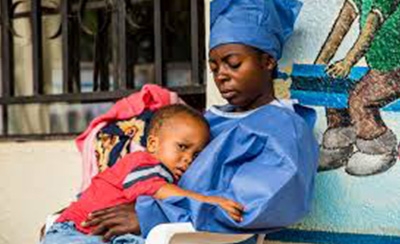
“Don’t allow COVID-19 lessons to go to waste; prioritize Capacity Building and coordinate response efforts;” Calls Prof. Emmanuel NNADOZIE, of ACBF
The impact of the COVID-19 pandemic has been unremitting, but African countries should not allow its bitter lessons to go to waste. Instead, the lessons should guide them to address the areas they missed in the past.
This call was made by Prof. Emmanuel NNADOZIE, the African Capacity Building Foundation’s (ACBF) Executive Secretary, as Africa battles the peak of the Corona Virus.
“I believe that even though this pandemic is a major crisis for the continent, it also presents an opportunity to do the things that our countries ought to have done. There is the Abuja Agreement of investing 7% of public expenditure in heath, but health systems across the continent are still in bad shape. We now have the opportunity to deal with the short-term issue of controlling and preventing the spread of the virus, and at the same time; to restructure the budgets and to re-channel resources into the public health systems to be able to deal with the pandemic.”
One of the major lessons that COVID-19 has taught Africa is the danger of not investing in human capital and institutions. In its simplest form, human capital development is mostly about health and education, even though some experts say it goes beyond that to social capital and other areas.
But as Prof. Nnadozie explains, “if countries neglect investment in health and education, (i.e, human capital), it becomes difficult to achieve real development or to transform economies in a way that provides resilience and stability. The lesson here, which the ACBF has been highlighting over nearly three decades, is that investment in critical capacities is highly crucial and is now even more important than ever.”
The recent ACBF’s e capacity assessment to achieve the African Union (AU) Agenda 2063, revealed a serious lack of critical skills required for transformation to happen in Africa. Among others, the assessment confirms that the continent has a serious need of thousands and thousands of engineers, medical doctors, nurses, first responders and all health care workers. Beyond the investment in human capital, is the issue of the retention of the trained human capital on the continent. This, according to the Executive Secretary, is far more critical.
“The utilization of this human capital is extremely important because we find situations where African countries are now subsidizing the West by expending their little resources in training nurses and doctors only for them to emigrate to North America and other Western countries who do not need that kind of subsidy,” Prof. Nnadozie says.
For nearly three decades now, the ACBF has been aggressively promoting and proposing capacity retention and utilization of policies and strategies to help African countries to minimize the ‘brain drain’ crisis, in order to maintain maximum investment necessary for the training of human capital.
Prof. Nnadozie called for more efforts saying “even though it is clear to all that capacity is the missing piece of the central point, there is more lip service than action. As a result, investment in capacity development over the years has been grossly inadequate, which is surprising, because one would expect that given the enormity of the challenge that faces African countries, capacity building would be one intervention under serious consideration.”
Good Economic Management
To the Executive Secretary, there is no better policy than having good economic management, debt sustainability, and restructuring of the economy. However, though African countries have often talked about economic transformation, both the critical skills and infrastructure required for this to happen are still not in place.
Prof. Nnadozie says COVID-19 pandemic has caused both the supply and a demand shocks in African economies, stressing that once a country has these two shocks at the same time, it becomes very difficult to solve the resultant problems.
Turning to the consequences of the pandemic, the Executive Secretary emphasized that “the policies that should be put in place by African countries should be viewed from both the reduced-demand lense and the lense of the direct impact of the disease, the impact of the response to the disease, and what happens when the disease is over.”
Articulating Africa’s needs
Prof. Nnadozie has however commended Africa for its articulation of the support it needs to fight the COVID-19 crisis.
“From the capacity standpoint, we have been in touch with our stakeholders, including member states, on what their needs would be and many of them have seriously articulated these needs and we are working with our partners to see how we can support our member states,” the Executive Secretary disclosed.
There is an ongoing discussion by ACBF member states with the AfDB, World Bank, IMF and the European Union. The African Union has also been involved to coordinate the discussions which are meant to articulate the needs of Africa in an informed, organized, coherent and comprehensive manner possible.
The central challenges of the COVID-19 pandemic remain countries’ weak capacity to conduct testing and detection, treatment and critical care, mobilizing and managing resources, managing the economy, protecting the poor and the vulnerable, communicating and building awareness.
African health ministers have been engaging together to jointly articulate these needs. On the other hand, The African Capacity Building Foundation advices member-states to look beyond health, to reflect on the social and economic development dimensions
“In all this, coordination is very important. There has to be better coordination in inter-departmental and inter-ministerial efforts,” the ES says. “There should also be coordination at different levels of government and at sub-national, national and regional levels, as without coordination, it will be difficult to solve this global problem,” concludes Prof. Nnadozie.





